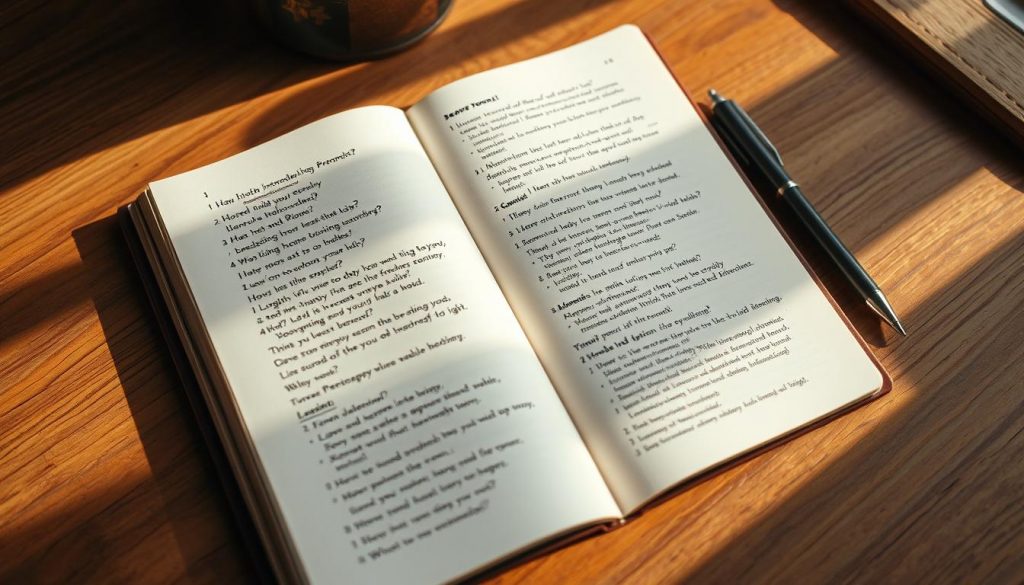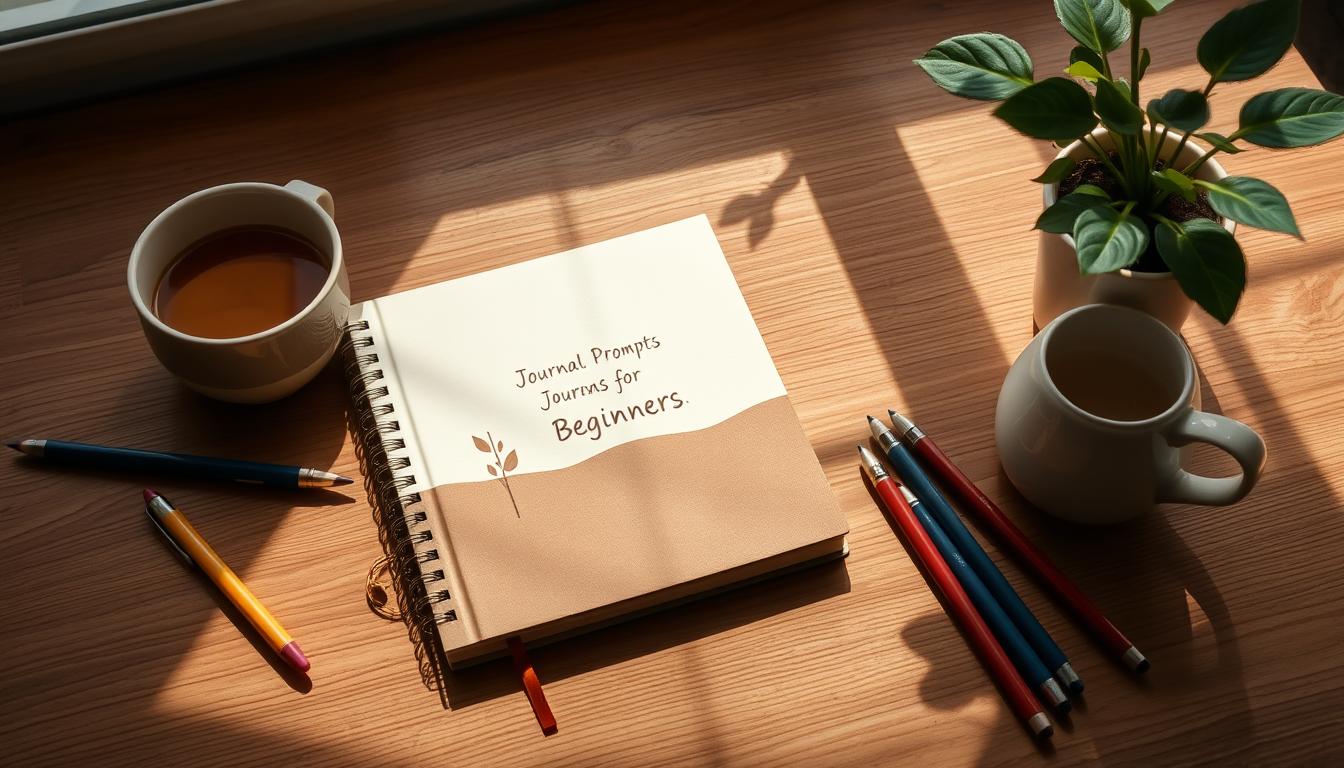Facing a blank journal page can be scary. You might feel unsure about what to write. Don’t worry, many people feel this way when starting their journal.
Journal prompts are like friendly guides for beginners. They help you explore self-expression and make starting easier. With over 500 prompts on various topics, you’ll always have ideas.
These prompts can unlock your creativity and self-understanding. About 60% of new journalers use prompts to beat writer’s block. They’re a great way to start your personal growth journey.
Journal prompts can help with self-discovery and creativity. They can also help you write regularly. Think of them as a compass for your personal storytelling.
Ready to turn that blank page into a canvas of insights? Let’s explore journaling prompts. They’ll spark your writing journey and help you find your voice.
Understanding the Purpose of Journaling
Journaling is a powerful tool for personal growth. It helps with self-discovery and mental wellness. Starting a reflection journal opens a door to deeper self-understanding.
Mindful writing can transform your emotional landscape. Research reveals fascinating insights about this practice.
- 85% of journalers report feeling less anxious
- 70% find it easier to express emotions in writing
- 60% gain clarity about their life goals
Benefits of Keeping a Journal
Writing prompts can unlock incredible personal insights. Journaling offers many advantages.
| Benefit | Impact |
|---|---|
| Stress Reduction | Provides emotional release and calm |
| Emotional Intelligence | Enhances self-understanding |
| Memory Improvement | Transfers thoughts to long-term memory |
How Journaling Can Improve Your Mental Health
Consistent journaling changes your brain. The amygdala becomes calmer, helping you process emotions better. Just 5-15 minutes daily can spark significant mental health improvements.
“Writing is a form of therapy; sometimes I wonder how all those who do not write, compose, or paint can manage to escape the madness, melancholia, the panic and fear which is inherent in a human situation.” – Graham Greene
Begin your journaling journey today. Your mental health will benefit greatly from this practice.
Getting Started with Your Journal
Starting a journal can be both thrilling and daunting. Many writers face blank pages, unsure how to begin. Your first move? Pick a journal that matches your style.

Selecting the right journal is a personal quest. It can greatly affect your writing experience. Consider these factors when choosing your journaling companion:
- Personal aesthetic that inspires you
- Comfortable paper quality
- Size that fits your lifestyle
- Binding style that feels right
Finding Your Perfect Journaling Style
Journaling takes many forms. Some prefer traditional notebooks, others like digital platforms or guided journals. The Bullet Journal method, created by Ryder Carroll, is popular for productivity and goal-setting.
“The most important thing is to find a journal that makes you want to write.” – Anonymous Journaling Enthusiast
Creating a Consistent Journaling Routine
Building a regular journaling habit is key. Just 5-10 minutes daily can help form a lasting practice. 88% of people who journal report better emotional health.
- Choose a consistent time of day
- Start with short, manageable sessions
- Keep your journal easily accessible
- Be patient with yourself
Your journaling path is unique. The most crucial step is to simply begin. Explore daily writing ideas or dive into self-reflection.
First Steps: Overcoming Writer’s Block
Starting your free journaling journey can be daunting, especially when facing writer’s block. The blank page might seem overwhelming. But don’t worry! Creative prompts and techniques can unlock your writing potential.

Did you know that 81% of writers experience writer’s block? This common challenge affects many. Understanding this can help you approach journaling with compassion and strategy.
Simple Techniques to Spark Inspiration
Discover powerful methods to kickstart your writing momentum:
- Freewriting for 10 minutes without stopping
- Using random word generators as creative prompts
- Exploring stream of consciousness writing
- Recording daily observations and emotions
“Write without fear, edit without mercy.” – Unknown
Embracing Imperfection in Your Writing
Perfectionism can stop your creative expression. Consider these insights:
| Writing Barrier | Impact | Solution |
|---|---|---|
| Fear of Imperfection | 66% of writers struggle | Embrace rough drafts |
| Procrastination | 70% experience delays | Set small, achievable goals |
| Self-Criticism | 54% halt progress | Practice self-compassion |
Remember, your journal is a personal space for growth, not a published masterpiece. Let go of expectations. You’ll discover the true magic of free journaling and unleash your creativity.
50 Journal Prompts to Kickstart Your Journey
Starting a journal can be tough. Creative prompts help break writer’s block and spark self-exploration. They increase writing frequency for 78% of journal writers.
These prompts will turn blank pages into windows of personal discovery. They’ll help you unlock your inner thoughts and feelings.

Journaling is a journey of self-understanding. It’s more than just writing down your thoughts. 72% of regular journalers use prompts for self-reflection and growth.
Prompts for Self-Discovery
Explore your inner landscape with these transformative prompts:
- What are three core values that define you?
- Describe a moment that changed your perspective
- Write about a dream you’ve never shared
- Map out your ideal life in five years
Prompts for Gratitude
Cultivate positivity with gratitude-focused writing:
- List five unexpected blessings from this week
- Describe someone who has positively impacted your life
- Reflect on a challenge that taught you something valuable
- Write about a simple pleasure that brings you joy
Prompts for Personal Growth
Challenge yourself with introspective creative prompts:
| Growth Area | Journaling Prompt |
|---|---|
| Emotional Intelligence | Describe a recent emotional reaction and its root cause |
| Skill Development | What skill do you want to master, and what first step will you take? |
| Personal Boundaries | Write about a boundary you need to establish or strengthen |
“Your journal is a safe space to explore, dream, and grow.” – Anonymous
Unique prompts lead to deeper insights for 80% of people. These prompts will unlock your creativity and self-understanding.
Remember, there are no right or wrong answers. Just write about your authentic experiences and feelings.
Exploring Your Emotions Through Journaling
Emotional journaling can transform your inner world. It offers a powerful way to understand your deepest feelings. Your journal provides a safe space to explore emotions without judgment.

Research shows the benefits of emotional journaling. About 90% of people gain clarity about their feelings through guided prompts. Your journal becomes a personal sanctuary for processing complex emotions.
Writing About Your Feelings
When writing about emotions, consider these strategies:
- Use descriptive language to capture your emotional state
- Write without censoring your thoughts
- Explore the root of your feelings
- Practice self-compassion during writing
“Journaling is like whispering to one’s self and listening at the same time.” – Mina Murray
Identifying Patterns in Your Emotions
Mindful writing helps you spot recurring emotional themes. Studies show journaling can reduce anxiety and depression symptoms. This happens after three months of regular practice.
Look for emotional patterns by:
- Reviewing past entries
- Noting repeated emotional triggers
- Tracking your emotional responses
- Identifying growth and changes
Your journal is a powerful tool for emotional intelligence. Regular exploration of feelings develops deeper self-awareness. It also builds emotional resilience.
The Role of Creativity in Journaling
Journaling goes beyond traditional writing. It’s a powerful canvas for self-expression. Creative prompts can turn your journal into a playground of imagination and discovery.
Free journaling breaks traditional writing boundaries. It’s about exploration, not perfection. This process encourages authentic self-expression.
Integrating Art and Visual Elements
Your journal can become a multimedia experience. Here are some creative approaches to try:
- Sketch quick drawings alongside your written entries
- Incorporate color-coded emotional mapping
- Create collages representing your daily experiences
- Use watercolors to express complex feelings
“Creativity is intelligence having fun.” – Albert Einstein
Using Poetry and Prose in Your Entries
Mixing writing styles can unlock deeper emotional insights. Studies show varied writing techniques boost creative thinking. About 70% of people experience this benefit.
| Writing Style | Creative Benefits | Emotional Impact |
|---|---|---|
| Free-form Poetry | Unleashes raw emotions | High expressiveness |
| Structured Prose | Provides clear narrative | Moderate reflection |
| Stream of Consciousness | Captures unfiltered thoughts | Deep introspection |
Remember, your journal is a judgment-free zone where creativity knows no boundaries. Embrace imperfection in your writing. Let your imagination guide your journaling adventure.
Keeping Your Journal Private and Safe
Protecting your personal thoughts is vital when keeping a journal. Your journal is a private space for exploring emotions without judgment. It’s where you can reflect freely and authentically.

Privacy is key to effective journaling. A safe environment lets you express yourself openly. This freedom enhances your journal writing experience.
Strategies for Journal Protection
- Choose a secure physical storage location
- Use locks or hidden compartments
- Consider digital encryption for electronic journals
- Establish clear boundaries with family members
Digital and Physical Safety Techniques
| Method | Protection Level | Recommended For |
|---|---|---|
| Password-Protected Digital Journal | High | Tech-savvy Writers |
| Lockable Physical Notebook | Medium | Traditional Journalers |
| Hidden Home Storage | High | Maximum Privacy Seekers |
“Your journal is a sacred space for personal exploration and growth.”
Journaling helps cope with uncertain times like the COVID-19 pandemic. Protecting your journal keeps your vulnerable thoughts confidential and secure.
Maintaining Confidentiality
Your journal belongs only to you. Set clear personal boundaries about sharing your writings. Trust your gut when it comes to your intimate thoughts.
Create a safe, judgment-free zone for self-reflection. This space will nurture your personal growth and development.
Making Journaling a Daily Habit
Regular journaling can spark personal growth and deep insights. It’s not always easy to keep up, but smart strategies can help. These approaches can boost your daily writing and journaling ideas.
Creating a Consistent Routine
Planning is key to building a journaling habit. Writing for 15 minutes three times weekly can ease anxiety and boost emotional strength. Here are ways to make journaling part of your day:
- Choose a specific time of day for writing
- Start with short 2-minute writing sessions
- Link journaling to an existing habit (habit stacking)
- Create a comfortable, inviting writing space
Setting Realistic Goals for Your Journaling Practice
“The key is not perfection, but consistency in your daily writing ideas.”
Achievable goals can boost your journaling success. Implementation intentions can increase habit adherence by up to 80%. Try these goal-setting methods:
- Begin with 2-3 minute daily entries
- Use structured journaling prompts
- Track your progress with a habit tracker
- Reward yourself for meeting milestones
Don’t worry if you miss a day. Most successful journalers keep going after occasional slip-ups. Your journaling journey is unique and flexible.
It’s designed to support your mental health and self-discovery. Enjoy the process and let it guide you to new insights.
Reflecting on Your Journal Entries
Your reflection journal is a powerful tool for personal growth. It helps you understand your inner world through mindful writing. By reviewing past entries, you can uncover patterns and track your emotional journey.
This process offers profound insights into your personal development. It reveals how you’ve changed over time.
When exploring your reflection journal, focus on key aspects of growth. Look for emotional patterns and triggers. Note personal challenges and how you’ve overcome them.
Pay attention to changes in your perspectives and beliefs. Identify recurring themes in your life experiences.
- Emotional patterns and triggers
- Personal challenges and how you’ve overcome them
- Changes in your perspectives and beliefs
- Recurring themes in your life experiences
What to Look for in Your Reflections
Mindful writing requires intentional review. Read your entries chronologically. Look for key elements that show your growth.
- Transformative moments that sparked significant change
- Consistent dreams and aspirations
- Recurring obstacles and your strategies for addressing them
“Your journal is a mirror reflecting your inner landscape, revealing growth invisible to the naked eye.”
Lessons Learned from Your Writings
Each journal entry carries wisdom. Look for lessons embedded in your experiences. Recognize your strengths and acknowledge your vulnerabilities.
Celebrate your personal evolution through consistent reflection. This practice turns simple writing into a tool for self-discovery.
Dedicate time to review your reflection journal regularly. You’ll gain valuable insights and foster continuous personal growth.
Sharing Your Journal Journey
Journaling can be a shared experience. Sharing your ideas can create powerful connections and inspiration. The digital age offers many chances to explore and expand your writing community.
Connecting with other journal fans can transform your writing practice. It can create a supportive network of creativity and growth. Studies show that sharing journaling experiences improves relationships for 67% of people.
Exploring Online Journaling Platforms
- Medium – Platform for personal essays and reflective writing
- Instagram – Visual journaling with writing prompts
- Reddit journaling communities
- Specialized blogging platforms
Benefits of Sharing Your Journaling Journey
| Sharing Method | Potential Benefits |
|---|---|
| Personal Blog | Creative expression, potential audience engagement |
| Online Communities | Support, feedback, inspiration |
| Social Media Platforms | Wider reach, connection with like-minded individuals |
Sharing is optional. Your journaling journey is deeply personal. The most important aspect is maintaining a practice that supports your growth.
“Journaling is a powerful tool for self-discovery, whether shared or kept private.”
About 70% of people say journaling helps them gain clarity and improve emotional well-being. Sharing selectively can inspire others while protecting your private thoughts.
Continuing Your Journaling Adventure
Your journaling practice opens doors to exciting creative writing opportunities. It’s the start of a transformative personal exploration. Creative prompts can unlock new dimensions of self-understanding and growth.
Your journaling toolkit will evolve as you become more comfortable writing. Try bullet journaling, art journaling, or themed journals focused on specific life aspects. Each approach offers unique ways to explore your thoughts and emotions.
Join online communities and workshops for inspiration. Many journalers recommend 21-day challenges or specialized writing workshops. Remember, your journaling practice is personal—choose the path that works best for you.
Next Steps After Mastering the Basics
Challenge yourself with complex prompts that push your creative boundaries. Integrate visual elements and experiment with different writing techniques. Develop a nuanced approach to self-reflection.
Your journal is a powerful tool for personal transformation. It’s waiting for you to explore its full potential.
Resources for Advanced Journaling Techniques
Connect with writing groups and attend virtual journaling workshops. Explore books offering advanced creative prompts. Platforms like Udemy, Skillshare, and local writing centers provide specialized courses.
These resources can help elevate your journaling practice to new heights. Dive in and discover the endless possibilities of advanced journaling.
FAQ
How often should I journal?
Start with what feels right for you. Even 5-10 minutes daily or a few times weekly can help. The key is finding a rhythm that fits your lifestyle and goals.
What if I’m not a good writer?
Journaling isn’t about perfect writing. It’s about expressing yourself honestly. Your journal is private, so don’t worry about grammar or spelling. Just let your thoughts flow naturally.
Do I need a special journal to start?
Any notebook, digital app, or loose pages will do. Choose something that feels comfortable and inviting to you. Some prefer fancy journals, while others like simple notebooks or digital platforms.
What should I write about if I’m stuck?
Use writing prompts for inspiration. Write about your day, feelings, or goals. You can make gratitude lists or explore your dreams and challenges.
Is it okay to skip days in my journal?
Yes! Journaling shouldn’t feel like a chore. If you miss days, just pick up where you left off. The goal is to make journaling a positive practice in your life.
How can I keep my journal private?
Use a journal with a lock or keep it in a safe place. You can also use a password-protected digital app. Creating a personal code is another way to ensure privacy.
What’s the difference between a diary and a journal?
Journals are often more intentional and goal-oriented. They can focus on personal growth, creativity, or specific themes. Diaries typically record daily events in chronological order.
How long should each journal entry be?
There’s no set length for entries. Some days you might write a few sentences, other days several pages. Write authentically without pressuring yourself to meet a specific word count.
Can journaling help with mental health?
Yes! Journaling can help manage stress and process emotions. It provides a safe space for self-exploration. This practice can boost self-awareness and support mental well-being.
Do I need to write every day?
Not necessarily. While daily journaling can be helpful, find a rhythm that works for you. Some people journal daily, others weekly or when they need to process thoughts.
Source Links
- 550+ Journal Prompts: The Ultimate List
- 50 Journaling Prompt Ideas for Beginners (and How to Use Them)
- Journaling Tips for Beginners to Encourage a Meaningful Life
- The Neuroscience of Journaling And Its Benefits
- How To Start A Journal: The Ultimate Guide For Beginners – She Dreams All Day
- 25 useful journaling prompts for beginners | Martha Brook
- Use these journaling prompts to unlock your inner writer (and overcome writer’s block)
- How to Overcome Writer’s Block Once and For All
- 50 Mindfulness Journal Prompts for More Self-Awareness – Robyn Marie Coaching
- Unique Journal Prompts – Questions for Self-Improvement
- Journal prompts & ideas for emotional release
- The Best Journal Prompts For Every Emotion You’re Feeling
- Journaling For Emotional Health: 12 Writing Prompts
- The deep rooted benefits of journaling for creativity. — The Wild Wordsmith
- 50 Inspiring Journal Prompts to Spark Your Creativity
- Unlocking Creativity: The Transformative Power of Journaling
- Tips for Keeping Your Journal Private and Safe
- Journaling Prompts I Swear By to Manage My Emotions
- How to Build a Journaling Habit That Lasts
- Build a Journaling Habit: How to Start Journaling for Beginners | Lucilehr.com
- 57 Deep Journal Prompts for Personal Growth & Self-Improvement – Sage & Bloom
- 70+ Journal Prompts for Self-Reflection
- Journey.Cloud – Free Online Journal & Diary
- Self-Reflection Journal Prompts | self-care | shaylaquinn.com
- Who Am I?: Journaling Prompts for Self-Discovery and Self-Reflection – Learning to Be Free
- 50 Easy Journal Prompts for Beginners – Boss Babe Chronicles
- Journal Prompts For Self Discovery: The Ultimate Guide

